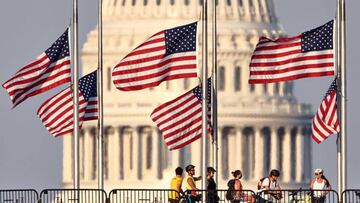Second stimulus check: who may not be eligible for the payment?
It is possible that some individuals who qualified for the first stimulus check may not be eligible in a second round of payments.

Over the coming weeks, lawmakers in Washington are set to debate the possibility of a second stimulus check as part of a wider coronavirus relief package for individuals, households and businesses.
Under the CARES Act passed in March, millions of Americans were deemed eligible for the first round of stimulus checks, valued at $1,200 per individual. As it stands, it is unclear how much a second stimulus check would be, who will qualify and, most importantly, whether such a payment will be approved at all.
In May, the Democrat-proposed Heroes Act was passed by the House of Representatives, under which eligible individuals who made less than $99,000 would receive a $2,000 stimulus check. However, the bill is fiercely opposed by Senate Republicans and President Donald Trump, who called it dead on arrival.
Senate Majority Leader Mitch McConnell has said that if the Senate passes another relief bill that includes more stimulus checks, the focus will be narrow. Therefore, it is possible that some individuals who qualified for the first stimulus check may not be eligible in a second round of payments. Below we look at some possible outcomes after a second relief package is passed by the Senate.
- Second Stimulus Check: will there be another payment in August?
- Stimulus check: who'll qualify for second Economic Impact Payment?
- Who may not be eligible for a second stimulus check?
- How much do I have to earn per year to be eligible for aid?
- Stimulus check: what did Mnuchin say about second payment?
Who may be ineligible for a second stimulus check?
Nobody qualifies: One outcome could be that a stimulus package could be signed into law that gives tax credits and other incentives to businesses, but does not include relief for individuals. In which case, no individuals will receive a second payment.
Higher earners: Under the Cares Act, single taxpayers with an adjusted gross income of up to $99,000 were eligible for the first $1,200 stimulus payment. However, that limit could be dropped to $40,000 if a second round of payments is approved, something that has already been raised by McConnell.
Related stories
"I think the people who have been hit the hardest are people who make about $40,000 a year or less. Many of them work in the hospitality industry. So that could well be a part of it,” McConnell said on July 6.
However, the 40,000 threshold has been opposed by Democratic leader Nancy Pelosi, who said on July 9: “I think families making over $40,000 probably need assistance, depending on their situation.”
Those who were ineligible for the first stimulus check: It’s likely that those were ineligible for the first round of stimulus payments would remain so for the second round. Namely:
- Single taxpayers with an adjusted gross income above $99,000.
- Heads of households with an AGI over $136,500.
- Married couples with an AGI over $198,000.
- Children over 16 and college students under age 24.
- Non-resident aliens, as defined by the US government.

